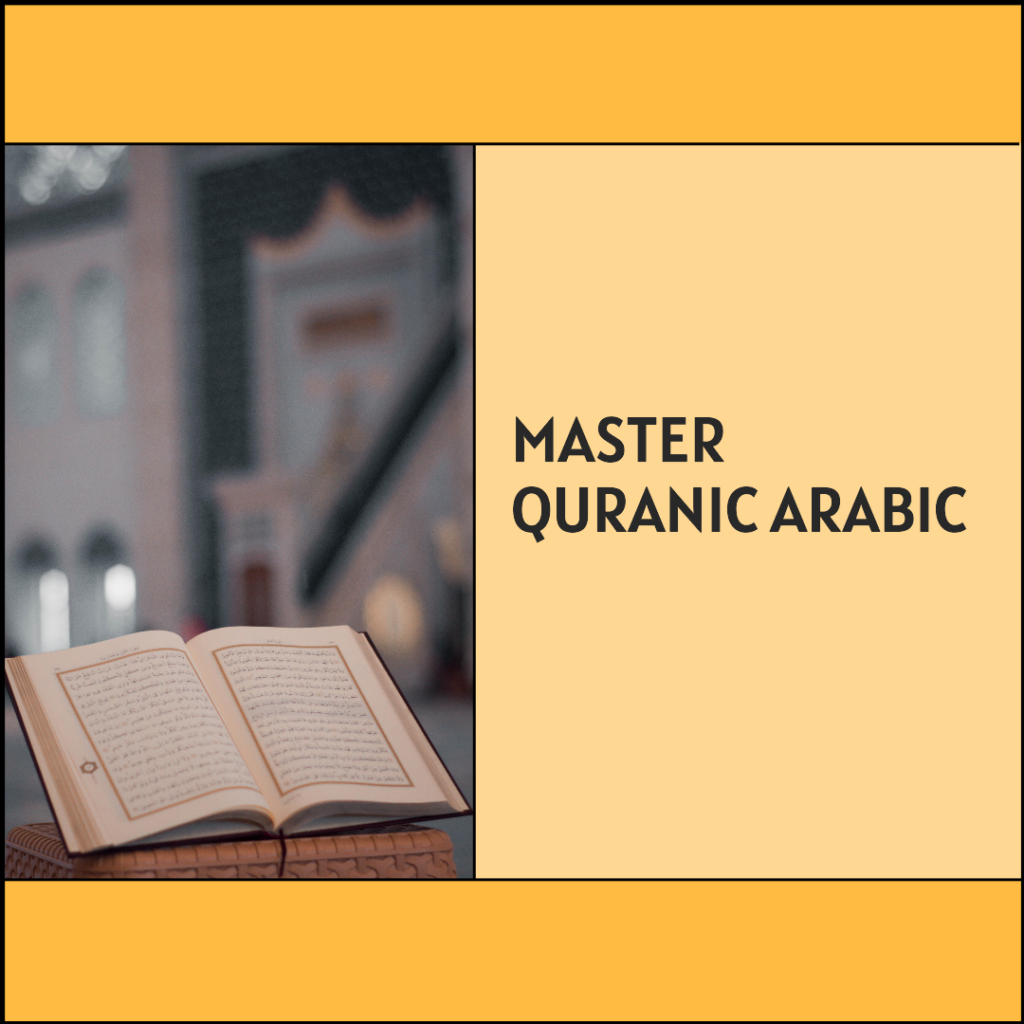Quranic Arabic
Introduction
In the digital age, learning Quranic Arabic has become more accessible and convenient than ever before. Whether you’re a devout Muslim seeking a deeper connection to the Quran or simply intrigued by the linguistic beauty of the sacred text, this article will guide you through the fascinating journey of learning Quranic Arabic online. Get ready to embark on a quest to decipher the language that carries the essence of Islamic culture and spirituality.

Exploring the Importance of Quranic Arabic
Before delving into the world of online courses, it’s essential to understand why Quranic Arabic is of paramount importance. The Quran, the holy book of Islam, is written in classical Arabic, also known as Quranic Arabic. Learning this language is not just about comprehension; it’s about connecting with the divine message and experiencing the beauty of the Quran at its core.
The Ease of Learning Quranic Arabic Online
Flexible Learning Schedules: Online courses in Quranic Arabic offer flexibility, allowing you to study at your own pace. No need to rush; you can adapt your learning to your busy life.
Interactive Lessons: Engage in interactive lessons that make learning enjoyable and immersive. You’ll not only read but also speak and understand Quranic Arabic.
Expert Guidance: Benefit from the expertise of qualified instructors who are well-versed in Quranic Arabic. They’ll guide you through the complexities of the language.
Access to Resources: Online courses provide access to a wealth of resources, including books, audio recordings, and practice exercises. You’ll have everything you need at your fingertips.
Starting with the Basics
Begin your journey by acquainting yourself with the Arabic script. Learn the alphabet, pronunciation, and basic grammar rules. Lay a strong foundation for your Quranic Arabic studies.
1.Vocabulary Building
Expand your vocabulary with words and phrases commonly found in the Quran. Understanding the meanings of these words will enhance your comprehension of the sacred text.
2.Grammatical Proficiency
Master the intricacies of Quranic Arabic grammar. Dive into verb conjugations, sentence structure, and syntactical nuances to decipher the Quran with precision.
3.Reading the Quran
As you progress, start reading verses from the Quran. Experience the joy of understanding the words of Allah in their original form.
Quranic Arabic as a Gateway to Islamic Literature
Once you’ve mastered Quranic Arabic, you’ll find it opens doors to a wealth of Islamic literature. You can explore classical Islamic texts, delve into the Hadith (sayings and actions of Prophet Muhammad), and read the works of renowned Islamic scholars in their original language. This deepens your understanding of Islamic theology, history, and philosophy.
Beyond Religious Context: The Wider Influence of Arabic. The influence of the Arabic language extends far beyond religion. Arabic is renowned for its contributions to mathematics, astronomy, medicine, and philosophy during the Islamic Golden Age. Learning Quranic Arabic may spark an interest in exploring these fields and their historical development.
The Significance of Quranic Arabic in Islamic Culture
Quranic Arabic holds a unique place in Islamic culture and history. Here’s why it’s so significant:
Preservation of the Quran: Quranic Arabic ensures the preservation of the Quran’s original text. It has remained unchanged for over 1,400 years, safeguarding the authenticity of the holy scripture.
Spiritual Connection: For Muslims worldwide, learning Quranic Arabic is not just an academic pursuit but a spiritual one. It strengthens their bond with the Quran and deepens their faith.
Understanding Religious Duties: Many religious obligations, such as daily prayers and recitations, are performed in Arabic. Learning Quranic Arabic helps Muslims understand the significance of these rituals.
Interpreting Islamic Law: Islamic jurisprudence relies on Quranic Arabic for interpreting and understanding Islamic law, making it essential for scholars and jurists.
Overcoming Challenges in Learning Quranic Arabic
While the journey to mastering Quranic Arabic is rewarding, it can also be challenging. Here’s how to overcome common obstacles:
Alphabet Mastery: Don’t rush through learning the Arabic alphabet. Solidify your understanding of each letter and its pronunciation before moving on to more complex aspects.
Consistent Practice: Regular practice is key. Dedicate a specific time each day to study Quranic Arabic to maintain consistency and progress.
Vocabulary Expansion: Build your vocabulary gradually. Focus on Quranic words and phrases used frequently in the holy text.
Seek Guidance: Don’t hesitate to seek help from experienced tutors or join online forums and communities of fellow learners. Learning in a group can be motivating and informative.
Patience and Perseverance: Remember that learning a new language takes time. Be patient with yourself and keep your goals realistic.
Conclusion
Learning Quranic Arabic online is a rewarding journey that opens doors to a profound understanding of Islam’s holy book. It’s an opportunity to explore the richness of a language that carries the divine message of the Quran. With the convenience of online courses, you can embark on this transformative experience from the comfort of your own home.
Unlock the linguistic beauty of the Quran and deepen your connection with Allah’s words. Start your Quranic Arabic journey today.
FAQs
1-Is it difficult to learn Quranic Arabic online?
Learning Quranic Arabic online is made easy with interactive courses and expert guidance. With dedication and practice, anyone can grasp it.
2-How long does it take to become proficient in Quranic Arabic?
The time it takes varies from person to person. However, with consistent effort, you can achieve proficiency within a year or two.
3-Are online Quranic Arabic courses suitable for all ages?
Yes, online courses cater to learners of all ages, from children to adults.
4-Can I learn Quranic Arabic for free online?
While some resources are free, comprehensive courses usually come with a fee. The investment is worth the knowledge gained.
5-Why is Quranic Arabic important for Muslims?
Quranic Arabic is vital for Muslims as it allows a deeper understanding of the Quran, enabling a more profound connection to their faith.



